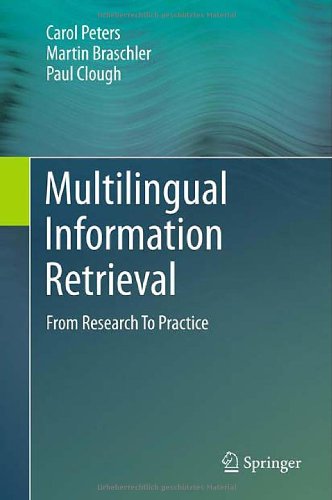

Most ebook files are in PDF format, so you can easily read them using various software such as Foxit Reader or directly on the Google Chrome browser.
Some ebook files are released by publishers in other formats such as .awz, .mobi, .epub, .fb2, etc. You may need to install specific software to read these formats on mobile/PC, such as Calibre.
Please read the tutorial at this link: https://ebookbell.com/faq
We offer FREE conversion to the popular formats you request; however, this may take some time. Therefore, right after payment, please email us, and we will try to provide the service as quickly as possible.
For some exceptional file formats or broken links (if any), please refrain from opening any disputes. Instead, email us first, and we will try to assist within a maximum of 6 hours.
EbookBell Team

4.1
20 reviewsWe are living in a multilingual world and the diversity in languages which are used to interact with information access systems has generated a wide variety of challenges to be addressed by computer and information scientists. The growing amount of non-English information accessible globally and the increased worldwide exposure of enterprises also necessitates the adaptation of Information Retrieval (IR) methods to new, multilingual settings.
Peters, Braschler and Clough present a comprehensive description of the technologies involved in designing and developing systems for Multilingual Information Retrieval (MLIR). They provide readers with broad coverage of the various issues involved in creating systems to make accessible digitally stored materials regardless of the language(s) they are written in. Details on Cross-Language Information Retrieval (CLIR) are also covered that help readers to understand how to develop retrieval systems that cross language boundaries. Their work is divided into six chapters and accompanies the reader step-by-step through the various stages involved in building, using and evaluating MLIR systems. The book concludes with some examples of recent applications that utilise MLIR technologies. Some of the techniques described have recently started to appear in commercial search systems, while others have the potential to be part of future incarnations.
The book is intended for graduate students, scholars, and practitioners with a basic understanding of classical text retrieval methods. It offers guidelines and information on all aspects that need to be taken into consideration when building MLIR systems, while avoiding too many ‘hands-on details’ that could rapidly become obsolete. Thus it bridges the gap between the material covered by most of the classical IR textbooks and the novel requirements related to the acquisition and dissemination of information in whatever language it is stored.